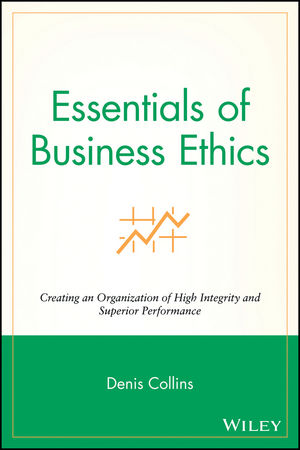Essentials of Business Ethics: Creating an Organization of High Integrity and Superior PerformanceISBN: 978-0-470-44256-2
Paperback
318 pages
May 2009
 This is a Print-on-Demand title. It will be printed specifically to fill your order. Please allow an additional 10-15 days delivery time. The book is not returnable.
|
||||||
Preface.
About the Web Site.
Acknowledgments.
PART 1 Background.
1 Human Nature and Unethical Behavior in Organizations.
Daily Occurrence of Ethical Dilemmas.
Competitive Advantages of Ethical Organizations.
Managing Morally Imperfect People.
What Is the Extent of Unethical Behaviors at Work?
What Types of Organizations and Operational Areas Have Ethical Problems?
Why Do Good People Behave Unethically?
What Are the Costs of Unethical Behaviors?
What Is Human Nature?
Summary.
Notes.
2 The Ethical Foundation of Capitalism and the Optimal Ethics Systems Model.
Adam Smith’s Capitalism and Business Ethics.
Federal Sentencing Guidelines.
The Optimal Ethics Systems Model.
Summary.
Note.
PART 2 Getting Everyone on Board.
3 Hiring Ethical People.
The Five-Step Ethics Job Screen Process.
Summary.
Notes.
4 Codes of Ethics and Codes of Conduct.
Difference Between a Code of Ethics and a Code of Conduct.
Importance of Code Expectations and Awareness.
Prevalence of Codes of Ethics and Conduct.
Code of Ethics Content.
Code of Conduct Content.
Effective Codes.
Annual Code of Ethics Assessment.
Summary.
Notes.
5 Ethical Decision-Making Framework.
Rotary International’s Four-Way Test.
Raytheon’s Ethics Quick Test.
The Ethics Decision-Making Framework.
The Five Ethical Theories.
Persuading Others.
Ten "Ethical Hazard Approaching" Signs.
Summary.
Notes.
6 Ethics Training.
Extent of Ethics Training.
Who to Train.
Web-Based Ethics Training.
Facilitating an Ethics Discussion.
Ethics Training Options.
Assessing the Ethics Training Workshops.
Summary.
Notes.
7 Respecting Employee Diversity.
Competitive Advantages of Diversity Management.
Four Layers of Diversity.
Implementing a Diversity Initiative.
Best Operational Practices for Managing Diversity.
Diversity Training Problems and Solutions.
Diversity Discussion Guidelines.
Diversity Training Exercises.
Summary.
Notes.
PART 3 Daily Internal Operations.
8 Ethics Reporting Systems.
Undesirable Employee Reactions to Ethical Issues.
Ethics & Compliance Officer (ECO).
Ombudsman.
Assist Lines.
Whistleblowing.
Summary.
Notes.
9 Ethical Leadership, Work Goals, and Performance Appraisals.
Managers as Ethical Role Models.
Great Place to Work® Dimensions.
Virtues and Leadership Practices.
Work Goals.
Performance Appraisals.
Collection and Evaluation Issues.
Performance Appraisal Feedback.
Disciplining Work Rule Violations.
Forgiveness.
Summary.
Notes.
10 Empowering Ethical Employees.
Go-Getters, Fence-Sitters, and Adversarials.
Effective Teams.
Systematic Team Problem-Solving Process.
Connecting Employees to the Mission—Appreciative Inquiry.
Daily Performance Reflections.
Scanlon-Type Gainsharing Plans.
Open Book Management.
Profit Sharing.
Stock Options.
Employee Stock Option Plans (ESOPs).
Cooperatives.
Summary.
Notes.
PART 4 Being a Good Citizen.
11 Environmental Management.
Competitive Advantages of Being Eco-Friendly.
Managing the Environmental Change Process.
Environmental Management System (EMS).
Environmental Risk Assessment.
The Natural Step (TNS) Framework and Cost Reductions.
Product Packaging and Design.
Green Buildings.
Environmental Performance Indicators.
Sustainability Reporting.
Summary.
Notes.
12 Community Outreach and Respect.
Business Case for Community Involvement.
What to Give.
Giving to Whom?
Team Building and Project Management Training Opportunities.
Community Involvement Management Process.
Community Reputation Assessment.
Social Performance Reporting.
Summary.
Notes.
Index.



